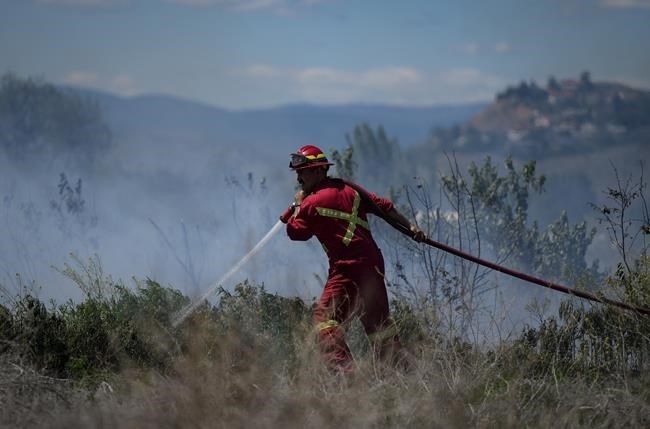Firefighters battling hundreds of blazes in British Columbia say they've been facing more than the usual obstacles when "irresponsible" members of the public interfere with operations.
The BC Wildfire Service says it has had to deal with several people riding all-terrain vehicles around active work sites, boaters interfering with helicopters trying to collect water and in one case, a drone forcing a halt to the air fight.
Fire information officer Donna MacPherson said Tuesday that the behaviour impacts efforts to put out fires and leaves both those interfering and firefighters at risk.
She said interference on the ground pulls resources away to deal with getting the unwanted visitors out safely, and any delays in air support can affect how well a fire is fought.
"So, there's multiple ways in which irresponsible public behaviour can impact the actual outcome that our firefighters are trying to achieve," she said.
In a statement, the service said there have been several reports of people riding ATVs around active work sites and getting in the way of heavy equipment operators and firefighters battling multiple fires in the Burns Lake area in northwestern B.C.
Last weekend, aerial firefighting operations in B.C's northwest were temporarily suspended due to a drone being flown near a wildfire.
MacPherson said that legally people need to stay away from fire sites in the same way that applies to places such as construction sites.
"Because the people that are doing the building are responsible for making sure that not only are their own people safe, but also that people don't enter into their work site without permission," she said.
"So for us, our work site is wherever we're working. So basically, if they see our equipment working, they need to get out."
Federal aviation laws ban drones from flying near wildfires, with penalties that include fines or even jail. Interfering with a wildfire work site could lead to a $1,150 fine under the provincial Wildfire Act, the service says.
MacPherson said firefighters are not focused on what motivates people to break the rules but make it clear to anyone they find that what they're doing is illegal.
They'll also collect names, if possible, as well as descriptions or other details to pass on to authorities including RCMP, conservation officers and Ministry of Forest personnel, who can issue fines.
Officials were not able to provide details Tuesday on how many fines have been issued this season.
MacPherson said it's difficult to know whether interference is a growing problem, but officials are making more of an effort to speak out publicly when it happens.
"I think a lot of what's happening is that we're being a little bit more forthright and assertive when it happens. We're saying when it happened, and we're trying to explain what happened, as best we can," she said.
"Where sometimes before, it would have just been a little bit more managed locally."
The province's wildfire season set a new record Tuesday for the total area burned in a year, with almost 14,000 square kilometres scorched and hundreds of fires burning across the province.
This report by The Canadian Press was first published July 18, 2023.
Ashley Joannou, The Canadian Press



